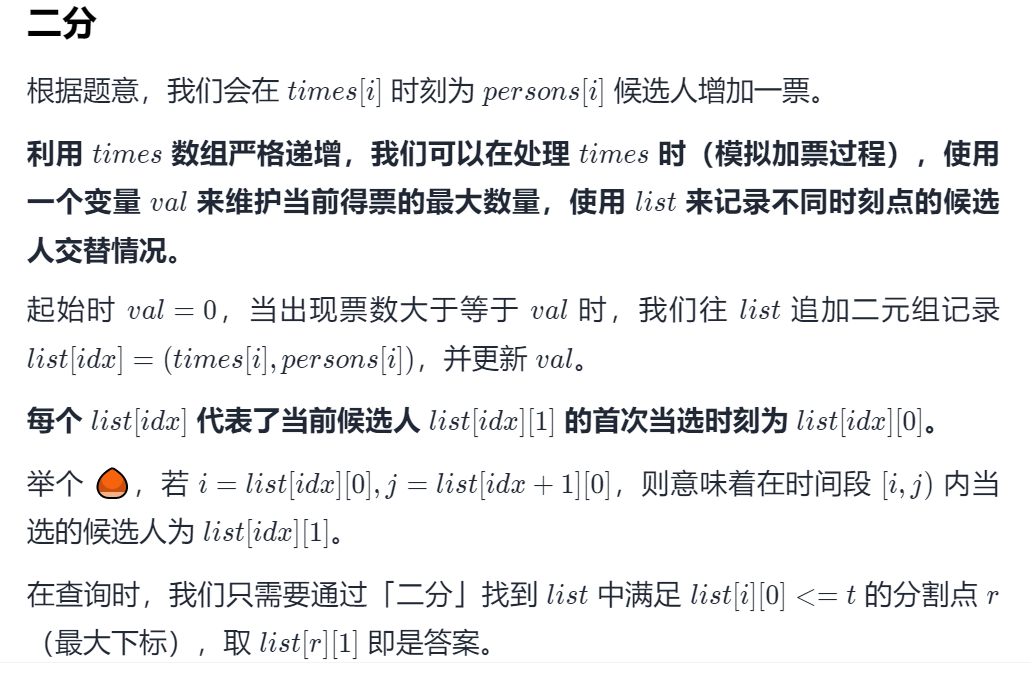给你两个整数数组 persons 和 times 。在选举中,第 i 张票是在时刻为 times[i] 时投给候选人 persons[i] 的。
对于发生在时刻 t 的每个查询,需要找出在 t 时刻在选举中领先的候选人的编号。
在 t 时刻投出的选票也将被计入我们的查询之中。在平局的情况下,最近获得投票的候选人将会获胜。
实现 TopVotedCandidate 类:
TopVotedCandidate(int[] persons, int[] times) 使用 persons 和 times 数组初始化对象。
int q(int t) 根据前面描述的规则,返回在时刻 t 在选举中领先的候选人的编号。
示例:
输入:
[“TopVotedCandidate”, “q”, “q”, “q”, “q”, “q”, “q”]
[[[0, 1, 1, 0, 0, 1, 0], [0, 5, 10, 15, 20, 25, 30]], [3], [12], [25], [15], [24], [8]]
输出:
[null, 0, 1, 1, 0, 0, 1]
解释:
TopVotedCandidate topVotedCandidate = new TopVotedCandidate([0, 1, 1, 0, 0, 1, 0], [0, 5, 10, 15, 20, 25, 30]);
topVotedCandidate.q(3); // 返回 0 ,在时刻 3 ,票数分布为 [0] ,编号为 0 的候选人领先。
topVotedCandidate.q(12); // 返回 1 ,在时刻 12 ,票数分布为 [0,1,1] ,编号为 1 的候选人领先。
topVotedCandidate.q(25); // 返回 1 ,在时刻 25 ,票数分布为 [0,1,1,0,0,1] ,编号为 1 的候选人领先。(在平局的情况下,1 是最近获得投票的候选人)。
topVotedCandidate.q(15); // 返回 0
topVotedCandidate.q(24); // 返回 0
topVotedCandidate.q(8); // 返回 1
提示:
1 <= persons.length <= 5000
times.length == persons.length
0 <= persons[i] < persons.length
0 <= times[i] <= 109
times 是一个严格递增的有序数组
times[0] <= t <= 109
每个测试用例最多调用 104 次 q

class TopVotedCandidate {List<int[]> list;public TopVotedCandidate(int[] persons, int[] times) {int n = persons.length;list = new ArrayList<>();Map<Integer,Integer> map = new HashMap<>();int val = 0;for(int i = 0; i < n; ++i){map.put(persons[i],map.getOrDefault(persons[i],0)+1);if(map.get(persons[i]) >= val){val = map.get(persons[i]);list.add(new int[]{times[i],persons[i]});}}}public int q(int t) {int n = list.size();int l = 0, r = n-1;while(l < r){int mid = l + r + 1 >> 1;if(list.get(mid)[0] <= t) l = mid;else r = mid - 1;}return list.get(l)[1];}}/*** Your TopVotedCandidate object will be instantiated and called as such:* TopVotedCandidate obj = new TopVotedCandidate(persons, times);* int param_1 = obj.q(t);*/

